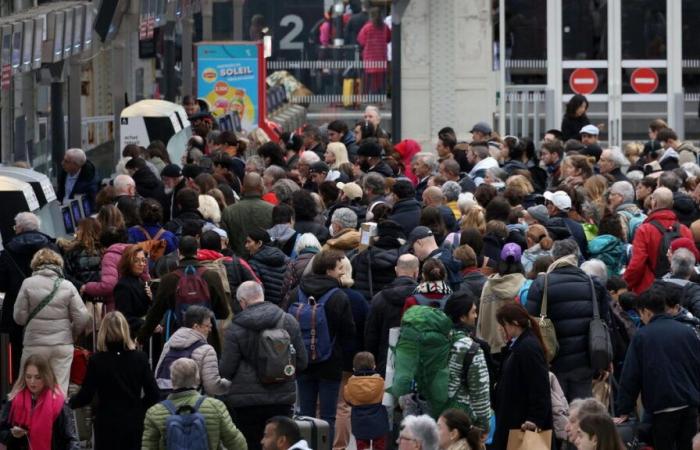
In Île-de-France, Thursday's strike called by all railway unions (CGT-Cheminots, Unsa-Ferroviaire, Sud-Rail and CFDT-Cheminots) risks disrupting part of local rail traffic, while this will be “almost normal on TGVs”.
The railway company gave more detailed forecasts in the Paris region in the afternoon. Service will thus be “normal to almost normal” on lines A, K, L and P, as well as on trams T4, T11, T12, and T13.
On the other hand, there will only be 3 trains out of 4 on average on line E. And only 2 trains out of three on average on lines C, J and U.
Traffic will be even more degraded on lines B, H and N, with one train in two on average. More precisely on the RER B, there will only be one train out of 2 to the north from Gare du Nord, 3 trains out of 4 from Châtelet-les-Halles – the traffic will be interoperated, which means that there will be no will not change trains.
As for the RER D and the Transilien R, you should expect only 1 train in 3 on average. For line D, only 2 trains out of 5 are planned on the Creil-Corbeil and Goussainville-Melun axes. During the morning and evening peak, there will only be 1 train out of 3 on the Corbeil-Malesherbes route. There will be no trains on the Juvisy-Corbeil via Ris and Corbeil-Melun via St Fargeau routes.
Line R will also be significantly affected: only 2 out of 3 trains will run on the Paris-Montereau-Montargis route. There will be no train on the Melun-Montereau route.
A renewable strike
The railway workers' unions are calling for a 24-hour strike to denounce the dismantling of Fret SNCF, with the elimination of 500 jobs out of 5,000, and the opening to competition in passenger transport, before a renewed movement to from December 11.
The company will be replaced on January 1 by two companies, one specializing in freight transport (Hexafret) and the other in locomotive maintenance (Technis). SNCF has promised zero layoffs by taking over all railway workers not retained in other group companies.
This dismantling results from an agreement signed between the government and the European Commission, after the opening of an investigation into illegal state aid paid to Fret SNCF. The agreement signed with Europe also provides for an opening of the capital to the private sector at the beginning of 2026. The unions denounce a privatization, which the management of the SNCF contests since the railway group will retain the majority of the capital.





